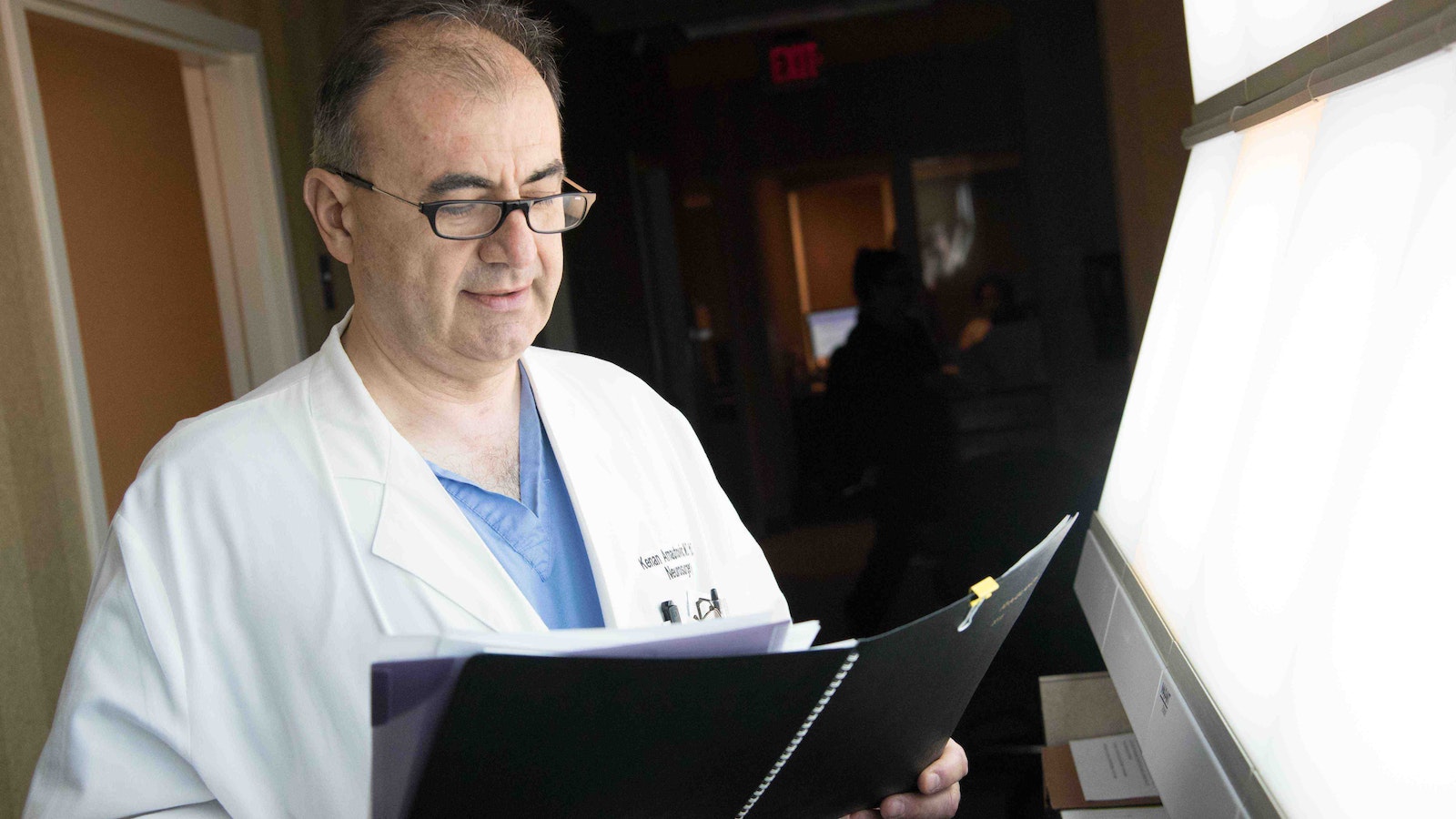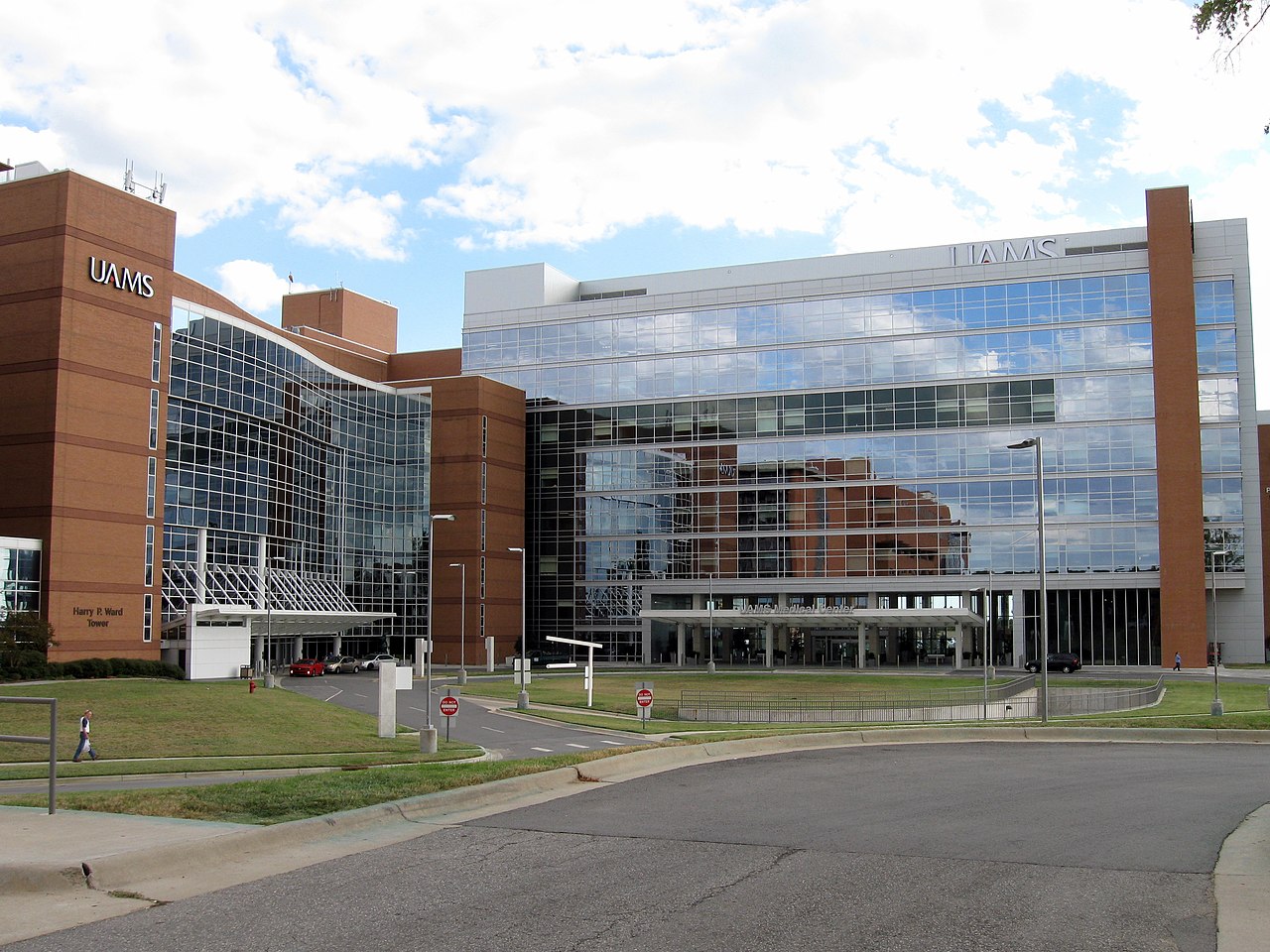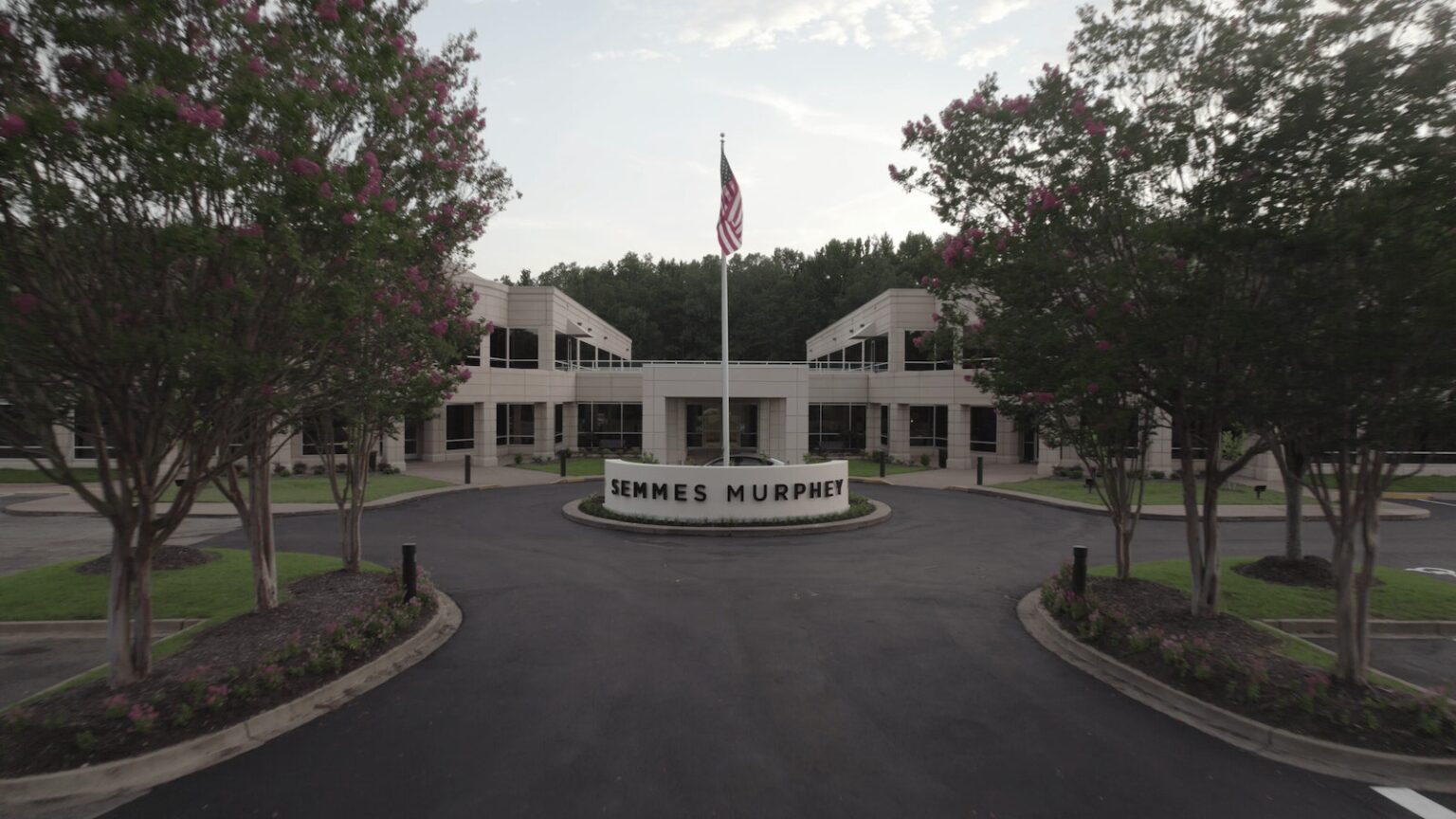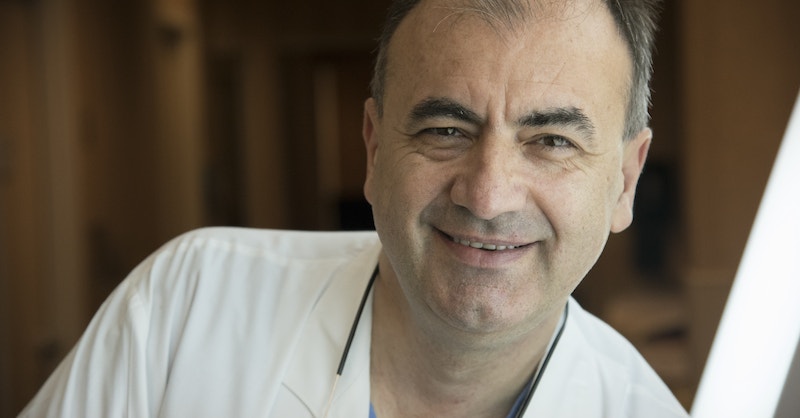
Most of the citizens who left their homes during the war in Bosnia and Herzegovina, after the signed peace agreement in Dayton, planned their return. However, the economic and political situation after achieving peace still did not allow life in the full capacity they were used to abroad, most often in Germany and other European countries and the United States of America. The country was completely devastated demographically, economically, and infrastructurally. At the same time, the BiH diaspora began to gather spontaneously in numerous organizations, which operate at the local level and continue to contribute to BiH in this way. One of the best and most influential doctors, and neurosurgeons in the United States and the world, Kenan Arnautović talks to FORBES BiH about his education at the Faculty of Medicine in Sarajevo, his specializations, his dismissal from KCUS, and his contribution to neurosurgery in BiH, the USA, and the education of BiH. doctors in America. Kenan Arnautović
Kenan Arnautović
Doctor Arnautović graduated from the Faculty of Medicine of the University of Sarajevo as the best student of his generation. He completed his first specialization in neurosurgery in Sarajevo and Hanover and the second at the University of Arkansas. He says that this is the proof of his love for medicine, double specialization in neurosurgery, in Bosnia and Herzegovina, and the USA. University of Arkansas for Medical Sciences, Wikipedia His mentor was the famous doctor Sam Al-Mefty, one of the best neurosurgeons in the world. In 1994, Arnautović immigrated to the United States of America. Since 2002, he has been working at the Semmes-Murphey Clinic and teaches neurosurgery at the University of Tennessee in Memphis. He actively publishes works in prestigious professional publications in neurosurgery; three times the Journal of Neurosurgery published his articles on the front page. He says that right at the beginning of his studies at the Faculty of Medicine, he knew that he would become a neurosurgeon. "The desire was born by attending the lectures of Professor Faruk Konjhodžić and later by attending brain and spine surgeries at a clinic in Sarajevo. During my specialization, I expressed my desire to visit foreign clinics and learn from great neurosurgeons." He stayed in Hanover for the first time in 1990 and then in 1991. For FORBES, he told the circumstances of his trip to Germany the year before the war in BiH began. "The second time in 1991, Yugoslavia at that time was already under sanctions, so it was not possible to fly to Germany but to the Netherlands and then by bus to Hanover. But I left with a smile and satisfaction. My parents helped me financially, and that's when I realized the importance of education, changing my way of thinking, and striving for excellence in my profession. That's when I overcame my fear of travel and contact with neurosurgical authorities. " I realized by looking at the top neurosurgeons, who were immigrants in Germany, that you can achieve great professional success with your efforts and talents, but also with hard work," says Dr. Arnautović.
University of Arkansas for Medical Sciences, Wikipedia His mentor was the famous doctor Sam Al-Mefty, one of the best neurosurgeons in the world. In 1994, Arnautović immigrated to the United States of America. Since 2002, he has been working at the Semmes-Murphey Clinic and teaches neurosurgery at the University of Tennessee in Memphis. He actively publishes works in prestigious professional publications in neurosurgery; three times the Journal of Neurosurgery published his articles on the front page. He says that right at the beginning of his studies at the Faculty of Medicine, he knew that he would become a neurosurgeon. "The desire was born by attending the lectures of Professor Faruk Konjhodžić and later by attending brain and spine surgeries at a clinic in Sarajevo. During my specialization, I expressed my desire to visit foreign clinics and learn from great neurosurgeons." He stayed in Hanover for the first time in 1990 and then in 1991. For FORBES, he told the circumstances of his trip to Germany the year before the war in BiH began. "The second time in 1991, Yugoslavia at that time was already under sanctions, so it was not possible to fly to Germany but to the Netherlands and then by bus to Hanover. But I left with a smile and satisfaction. My parents helped me financially, and that's when I realized the importance of education, changing my way of thinking, and striving for excellence in my profession. That's when I overcame my fear of travel and contact with neurosurgical authorities. " I realized by looking at the top neurosurgeons, who were immigrants in Germany, that you can achieve great professional success with your efforts and talents, but also with hard work," says Dr. Arnautović.  Semmes Murphey Clinic USA, official web page He is a member of eight American professional associations, including the American Association of Neurological Surgeons. He is a co-founder and member of the Bosnian-Herzegovinian-American Academy of Sciences and Arts (BHAAAS).
Semmes Murphey Clinic USA, official web page He is a member of eight American professional associations, including the American Association of Neurological Surgeons. He is a co-founder and member of the Bosnian-Herzegovinian-American Academy of Sciences and Arts (BHAAAS).
He also brought his American neurosurgeon colleagues to Sarajevo and Bosnia and Herzegovina. provided hospitals with a large number of equipment donations. Thanks to the reputation he enjoys in the USA, he arranged numerous trainings for Bosnia and Herzegovina. doctors in American clinics.
Would you do anything differently today in terms of your career? You have been in America since 1994, why did you leave and how did their healthcare system and approach affect you as a doctor and neurosurgery specialist? I never planned to leave Sarajevo and continue my career anywhere, not even in America. Due to circumstances, towards the end of the war, I received an invitation for a six-month subspecialization in the USA. I decided to leave after two and a half years of working in a surrounding city and return to Sarajevo armed with new knowledge and energy. That was my plan. However, the Clinical Center fired me immediately after I applied for specialization, leaving me with no choice but to seek further work and specialization to pursue my passion for neurosurgery. Step by step, with hard work and sacrifice, exam after exam, trial after trial, I came to the end of the second neurosurgical specialization in America. Can you single out the advantages of the American approach in neurosurgery, what is different compared to Europe? What is extremely important for a neurosurgeon to be successful? The American approach to neurosurgery is significantly different from the European one. The "hands-on" education of the specialists is being pushed so that upon completion of the specialization, they can immediately perform almost all types of operations independently. Unlike in Europe, the expertise of operations is not only on cranial operations but also on complex spine operations, deformities, reconstructions, endovascular neurosurgery, pediatric neurosurgery, functional neurosurgery, and expertise in trauma. Each of these neurosurgical segments in America must go through a 6-12 month "hands-on" mandatory rotation in these specific operative practices. In the end, the exact number of performed operations in those segments must be shown to be able to complete the complete educational specialization program. Since 2002, you have been working at the Semmes-Murphey Clinic and teaching neurosurgery at the University of Tennessee in Memphis. When you teach your students, how do you approach them? Do you have a special way of presenting challenging neurosurgical procedures? What is the most important thing for a student to learn in your course? My relationship with the residents is friendly, but they must respect the hierarchy. I hate messing up and forgetting details about pre- and postoperative patient care. I appreciate the professionalism and the complete work done before, during, and after the operation. My residents know this, and they know that due to the effort and better approach to the patient, they will get more minutes in the operating room and more difficult operations. When we co-author papers, it must be top-notch work, detailed literature reviews, top-notch illustrations, and the best scientific journals. It is not a good idea to spend days and weeks writing papers to publish that paper in a scientific journal, which no one in the world of neurosurgery reads. Then why did you bother? Publications in top journals should always be pursued. Of course, sometimes it is published in the less important, but the vast majority is the best. You are also the President of the Committee of the World Association of Neurosurgeons, for which you were nominated by your colleagues from the USA, how do you manage to balance all professional roles? What is your favorite role? It's not easy because these jobs are done at night, after a hard day, on the weekend, on the plane. However, I understand the transfer of knowledge and service to neurosurgery in the USA, Bosnia, and the world as a mission to return to the younger generation at least part of the knowledge that I gained working as a neurosurgeon for more than thirty years. My experiences will help younger people to reduce unnecessary time in education and publishing by teaching them how to work efficiently, which processes should not be spent on time, etc.  Kenan Arnautović, Semmes Murphey Thanks to your influence and position in America, you brought many Bosnian-Herzegovinian doctors to the United States of America for education, are you still working on that? What motivates you for that action? Did any of those doctors leave a special impression on you? Yes, about forty doctors from Bosnia, Croatia, Albania, Serbia, Germany, Russia, Syria, and many other countries spent a month or two at my clinic. Although I taught them, they also passed on knowledge about data collection from the literature and statistics. Several of them became neurosurgery leaders in their clinics through their work. I would now like to mention professors Ibrahim Omerhodžić, Eldin Burazerović, Mirza Pojskić, Fatos Oldashi, and Goran Lakičević. I am glad to see how much they have achieved. How do you cooperate with health institutions in Bosnia and Herzegovina, how do you establish contact and cooperation? Has a system been created under which doctors can regularly attend training in the USA? What would you change and what would you praise in that relationship? How do you feel about our healthcare system? I am open to cooperation if there is interest. I collaborate mostly through the Academy of Sciences and Arts (BHAAAS), of which I am a co-founder. That academy still carries the flag of scientific cooperation between the diaspora and Bosnia and Herzegovina. Many leaders from many professions, medical and non-medical, and my friends and colleagues have contributed immeasurably to the mission of BHAAAS. There is also planned cooperation with ANUBiH, of which I am a member, but also with clinical centers in Sarajevo, Tuzla, Zenica, and Mostar, of course, if there is interest. What advice would you give today to young neurosurgeons in Bosnia and Herzegovina, who are at the beginning of their careers? What is most important to become successful? The most important thing is to love what you do and be ready to dedicate your entire professional life to that goal. If there is no passion and willingness to give every day - all day - to that goal, there will be no results. What motivates you daily, given that it is an extremely demanding job, how do you maintain focus during surgery? Do you have a ritual in the operating room? When the operation does not go as planned, how do you react, what is important to do in those situations? Of course, there are days and hours when everything does not go well when the situation turns around, and when there are serious complications. Fortunately, this is extremely rare. Then everything should be done to stop the complication professionally, and then everything should be done to return the negative consequences to the initial position as much as possible. And you do this until you reach your goal. Arnautović concludes that he has fully realized himself in a professional sense. "I am proud to have been given the rare opportunity to be a professor of neurosurgery in the USA, membership in all relevant neurosurgical associations in America and the world, and many leadership positions. I only wish for good health so that I can perform this very difficult job with such enthusiasm and satisfaction for as long as possible, and for the benefit of patients and neurosurgery in general.". (https://forbes.n1info.ba/lideri/)
Kenan Arnautović, Semmes Murphey Thanks to your influence and position in America, you brought many Bosnian-Herzegovinian doctors to the United States of America for education, are you still working on that? What motivates you for that action? Did any of those doctors leave a special impression on you? Yes, about forty doctors from Bosnia, Croatia, Albania, Serbia, Germany, Russia, Syria, and many other countries spent a month or two at my clinic. Although I taught them, they also passed on knowledge about data collection from the literature and statistics. Several of them became neurosurgery leaders in their clinics through their work. I would now like to mention professors Ibrahim Omerhodžić, Eldin Burazerović, Mirza Pojskić, Fatos Oldashi, and Goran Lakičević. I am glad to see how much they have achieved. How do you cooperate with health institutions in Bosnia and Herzegovina, how do you establish contact and cooperation? Has a system been created under which doctors can regularly attend training in the USA? What would you change and what would you praise in that relationship? How do you feel about our healthcare system? I am open to cooperation if there is interest. I collaborate mostly through the Academy of Sciences and Arts (BHAAAS), of which I am a co-founder. That academy still carries the flag of scientific cooperation between the diaspora and Bosnia and Herzegovina. Many leaders from many professions, medical and non-medical, and my friends and colleagues have contributed immeasurably to the mission of BHAAAS. There is also planned cooperation with ANUBiH, of which I am a member, but also with clinical centers in Sarajevo, Tuzla, Zenica, and Mostar, of course, if there is interest. What advice would you give today to young neurosurgeons in Bosnia and Herzegovina, who are at the beginning of their careers? What is most important to become successful? The most important thing is to love what you do and be ready to dedicate your entire professional life to that goal. If there is no passion and willingness to give every day - all day - to that goal, there will be no results. What motivates you daily, given that it is an extremely demanding job, how do you maintain focus during surgery? Do you have a ritual in the operating room? When the operation does not go as planned, how do you react, what is important to do in those situations? Of course, there are days and hours when everything does not go well when the situation turns around, and when there are serious complications. Fortunately, this is extremely rare. Then everything should be done to stop the complication professionally, and then everything should be done to return the negative consequences to the initial position as much as possible. And you do this until you reach your goal. Arnautović concludes that he has fully realized himself in a professional sense. "I am proud to have been given the rare opportunity to be a professor of neurosurgery in the USA, membership in all relevant neurosurgical associations in America and the world, and many leadership positions. I only wish for good health so that I can perform this very difficult job with such enthusiasm and satisfaction for as long as possible, and for the benefit of patients and neurosurgery in general.". (https://forbes.n1info.ba/lideri/)